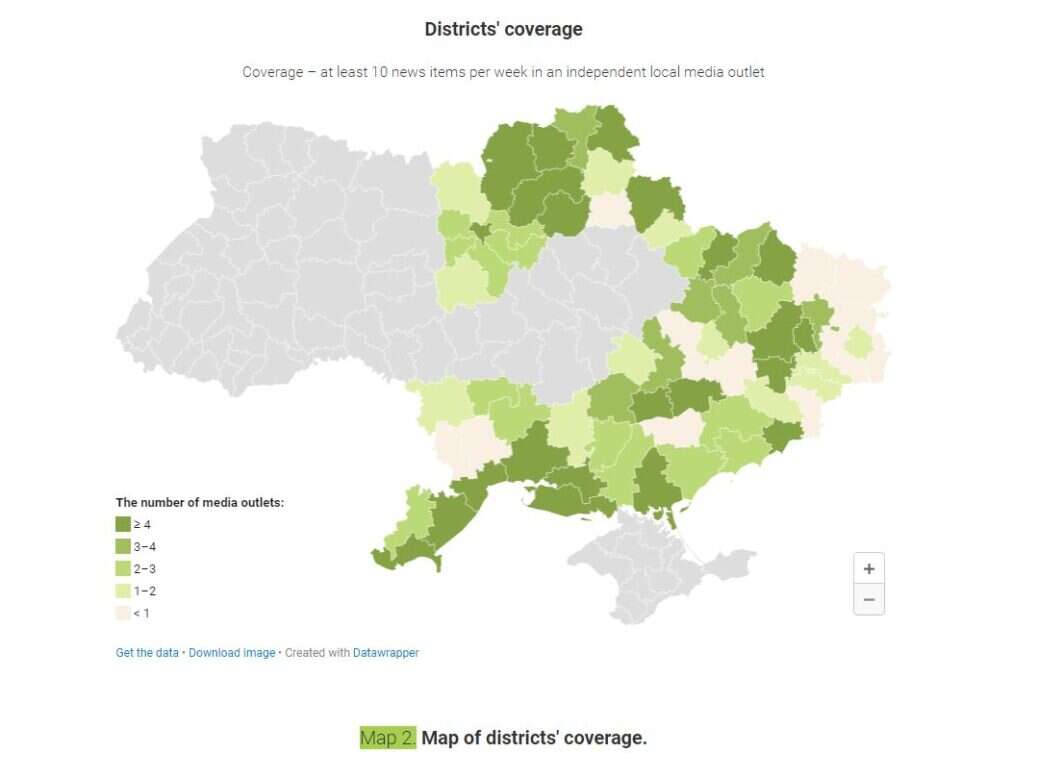
Local news deserts are a growing concern for democracy in the UK, but in Ukraine they are seen as a barrier to national recovery following the Russian invasion.
Research by the EU-funded Media Development Foundation has 13 rayons (or districts) of the country which are now devoid of independent local news (see main picture). The research has so far only looked at 11 out of Ukraine’s 24 oblasts (administrative areas).
Severely damaged Ukrainian regions were investigated to piece together the damage and decline of local journalism. The project found that journalism is essential to the nation’s recovery and attraction of foreign direct investment (FDI).
Launched in 2013, the Media Development Foundation (MDF) focuses on capacity building for independent local publishers.
The project’s head of research Maksym Sribnyi told Press Gazette how the project aims to raise awareness about Ukraine’s lack of local reporting and in turn, channel aid and investment into independent Ukrainian media.
He said: “The 11 regions we have covered in this first stage of research are recipients of aid from different countries.
“Local media is essential to overseeing this recovery process as it provides insight into the needs of each area.”
He added: “The idea of mapping news deserts was floating around before the war – but the full-scale invasion accelerated the need.
“The map of Ukrainian media organisations has been reshuffled thrice over ten years so we are not as aware of the regional situation as we should be.”
In the 11 regions covered, the team found 879 operating editorial teams. Kharkiv and Donetsk hosted the most independent editorial teams (14 and 13 respectively).
However, many deserts appear to be growing, such as in the case of Luhansk where many media outlets have disappeared since the Russian occupation.
The research found that in some cases, newspapers entirely consisted of reprinted press releases, suggesting they are operated from outside the local area, with no grounded or contextual understanding.
Andrey Boborykin, a resident expert with the MDF, oversaw the methodology and findings. He explained: “Ukraine has not performed well in terms of corruption, and of course, this has been present on the local level.
“Independent local journalism is essential in holding authorities accountable, so we see a direct correlation between safeguarding FDI and safeguarding the health of local media.”
He stressed the importance of integrating independent journalism into foreign aid packages, underlining how it is currently underrepresented.
Boborykin said the rapid decline of the digital advertising economy since the war has had extreme consequences on independent journalism.
He said: “The overall downturn in the economy makes the independent publishing sector even more reliant on support.
“At this time, it is hard to advise Ukrainian publishers anything but to work with international donor funds.”
However, Boborykin anticipates a change in the reader revenue economy.
He explained: “Our population has previously not been used to digital donations but they are now more comfortable with this since Ukrainians have been donating for military needs.
“This familiarity could help local newsrooms in the future.”
The investigation’s methodology is complex and has some gaps, which the researchers have themselves highlighted.
The research only acknowledged media outlets with at least some online presence, found it difficult to collect information from temporarily occupied territories, and ignored media outlets which did not indicate their ownership structure or focussed on too specific a topic.
They hope to expand their research to map the entire of Ukraine by May.
Email pged@pressgazette.co.uk to point out mistakes, provide story tips or send in a letter for publication on our "Letters Page" blog
